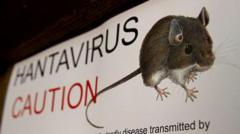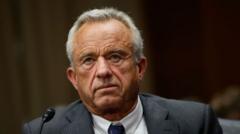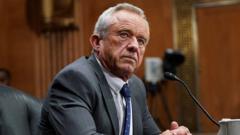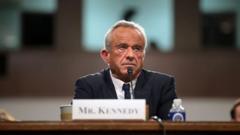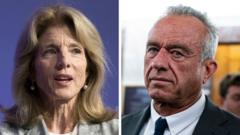Health Secretary Robert F. Kennedy Jr. has appointed a new committee to reevaluate children's vaccination schedules, prompting skepticism from public health advocates.
RFK Jr Appoints New Vaccine Panel for Children's Immunization Review

RFK Jr Appoints New Vaccine Panel for Children's Immunization Review
Analysis of Immunization Practices Raises Concerns Among Experts
The newly formed Advisory Committee on Immunization Practices (ACIP) convened for the first time this week, following the controversial dismissal of all 17 prior members by U.S. Health Secretary Robert F. Kennedy Jr. The panel, comprising seven members, is tasked with scrutinizing established vaccination protocols for children and adolescents, including vaccines that have been in use for over seven years.
Kennedy's selection of panel members has attracted scrutiny, particularly due to the inclusion of individuals known for their critical stance on vaccination. During the inaugural meeting, the newly appointed chair, Dr. Martin Kulldorff, disclosed that he was dismissed from his academic position at Harvard University for refusing the COVID-19 vaccine. He announced the panel's new initiatives, which include a review of the existing immunization schedule for hepatitis B in newborns, a widely recognized preventive measure against liver cancer.
Health professionals, however, voiced apprehensions about the motivations behind examining long-standing vaccines, suggesting it could imply shortcomings in the original approval processes. Bill Hanage, an epidemiology professor at Harvard TH Chan School of Public Health, termed the focus on older vaccines puzzling and unnecessary. The panel initially intended to vote on recommendations for a vaccine against Respiratory Syncytial Virus (RSV) but postponed that discussion.
Adding to the panel's controversies, the agenda includes a presentation on thimerosal, a mercury-based compound previously used in vaccines, which has been phased out in most cases. Critics, such as Dr. Paul Offit, voiced concern that Kennedy filled the panel with members who share his anti-vaccine ideologies, undermining the committee's scientific integrity.
Compounding the panel's challenges, member Dr. Michael Ross withdrew shortly before the meeting due to a pending review of financial interests, further contributing to the group's limited size and expertise. Republican Senator Bill Cassidy expressed reservations about the committee's qualifications, questioning whether it could effectively assess innovative vaccines like mRNA shots.
Kennedy's shift in the vaccine advisory committee underscores growing tensions in public health discourse, particularly around immunization practices amidst evolving pandemic narratives and vaccine technologies.
Kennedy's selection of panel members has attracted scrutiny, particularly due to the inclusion of individuals known for their critical stance on vaccination. During the inaugural meeting, the newly appointed chair, Dr. Martin Kulldorff, disclosed that he was dismissed from his academic position at Harvard University for refusing the COVID-19 vaccine. He announced the panel's new initiatives, which include a review of the existing immunization schedule for hepatitis B in newborns, a widely recognized preventive measure against liver cancer.
Health professionals, however, voiced apprehensions about the motivations behind examining long-standing vaccines, suggesting it could imply shortcomings in the original approval processes. Bill Hanage, an epidemiology professor at Harvard TH Chan School of Public Health, termed the focus on older vaccines puzzling and unnecessary. The panel initially intended to vote on recommendations for a vaccine against Respiratory Syncytial Virus (RSV) but postponed that discussion.
Adding to the panel's controversies, the agenda includes a presentation on thimerosal, a mercury-based compound previously used in vaccines, which has been phased out in most cases. Critics, such as Dr. Paul Offit, voiced concern that Kennedy filled the panel with members who share his anti-vaccine ideologies, undermining the committee's scientific integrity.
Compounding the panel's challenges, member Dr. Michael Ross withdrew shortly before the meeting due to a pending review of financial interests, further contributing to the group's limited size and expertise. Republican Senator Bill Cassidy expressed reservations about the committee's qualifications, questioning whether it could effectively assess innovative vaccines like mRNA shots.
Kennedy's shift in the vaccine advisory committee underscores growing tensions in public health discourse, particularly around immunization practices amidst evolving pandemic narratives and vaccine technologies.








